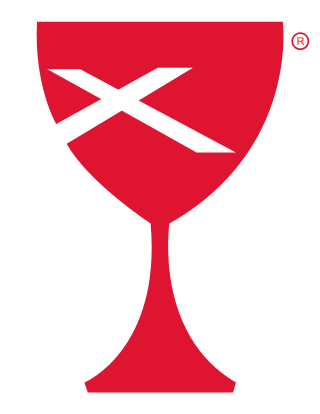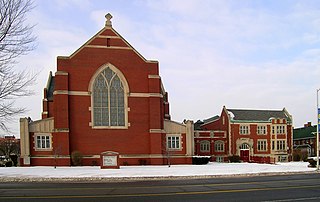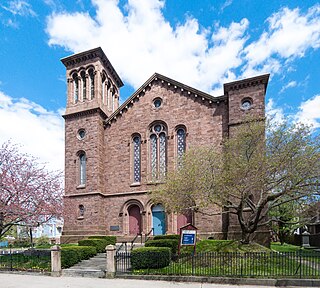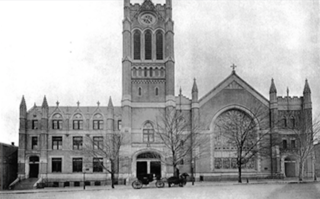
The Christian Church (Disciples of Christ) is a mainline Protestant Christian denomination in the United States and Canada. The denomination started with the Restoration Movement during the Second Great Awakening, first existing during the 19th century as a loose association of churches working towards Christian unity, then slowly forming quasi-denominational structures through missionary societies, regional associations, and an international convention. In 1968, the Disciples of Christ officially adopted a denominational structure at which time a group of churches left to remain nondenominational.

Congregational churches are Protestant churches in the Reformed (Calvinist) tradition practicing congregationalist church governance, in which each congregation independently and autonomously runs its own affairs.

The United Church of Christ (UCC) is a mainline Protestant Christian denomination based in the United States, with historical and confessional roots in the Congregational, Calvinist, and Lutheran traditions, and with approximately 4,700 churches and 745,230 members. The United Church of Christ is a historical continuation of the General Council of Congregational Christian churches founded under the influence of New England Pilgrims and Puritans. Moreover, it also subsumed the third largest Calvinist group in the country, the German Reformed. The Evangelical and Reformed Church and the General Council of the Congregational Christian Churches united on June 25, 1957, to form the UCC. These two denominations, which were themselves the result of earlier unions, had their roots in Congregational, Lutheran, Evangelical, and Reformed denominations. At the end of 2014, the UCC's 5,116 congregations claimed 979,239 members, primarily in the U.S. In 2015, Pew Research estimated that 0.4 percent, or 1 million adult adherents, of the U.S. population self-identify with the United Church of Christ.
The Congregational Christian Churches were a Protestant Christian denomination that operated in the U.S. from 1931 through 1957. On the latter date, most of its churches joined the Evangelical and Reformed Church in a merger to become the United Church of Christ. Others created the National Association of Congregational Christian Churches or joined the Conservative Congregational Christian Conference that formed earlier in 1945. During the forementioned period, its churches were organized nationally into a General Council, with parallel state conferences, sectional associations, and missionary instrumentalities. Congregations, however, retained their local autonomy and these groups were legally separate from the congregations.
The Evangelical Synod of North America, before 1927 German Evangelical Synod of North America, in German (Deutsche) Evangelische Synode von Nord-Amerika, was a Protestant Christian denomination in the United States existing from the mid-19th century until its 1934 merger with the Reformed Church in the United States to form the Evangelical and Reformed Church. This church merged with the Congregational Christian Churches in 1957 to create the United Church of Christ.
The National Association of Congregational Christian Churches (NACCC) is an association of about 400 churches providing fellowship for and services to churches from the Congregational tradition. The Association maintains its national office in Oak Creek, Wisconsin, a suburb of Milwaukee. The body was founded in 1955 by former clergy and laypeople of the Congregational Christian Churches in response to that denomination's pending merger with the Evangelical and Reformed Church to form the United Church of Christ in 1957.
The Conservative Congregational Christian Conference is a Congregationalist denomination of Protestant Christianity. It is based in the United States.
These congregations are affiliated with one of the five associations comprising the Heartland Conference of the United Church of Christ. They are listed in order of association.
Biblical Witness Fellowship is an evangelical renewal movement composed of members of the United Church of Christ. Founded in 1978 as the United Church People for Biblical Witness, the movement reorganized as the Biblical Witness Fellowship at a national convocation in Byfield, Massachusetts in 1984, hosted by the current president of BWF, the Rev. Dr. William Boylan.

The Evangelical Association of Reformed and Congregational Christian Churches is a fellowship of conservative evangelical Protestant Christian congregations in the United States that became disaffected from the United Church of Christ due to that denomination's national entities professing support for practices such as abortion and homosexuality. Unlike other more sectarian churches, the Evangelical Association does not forbid its member congregations to simultaneously belong to other denominations and fellowships, as the local churches continue to practice congregational polity.

The St. John's Christian Methodist Episcopal Church is a church located in Detroit, Michigan. It was built as the North Woodward Congregational Church, listed on the National Register of Historic Places in 1982, and designated a Michigan State Historic Site in 1998.

The United Congregational Church is a historic former church building in Newport, Rhode Island. The congregation was formerly affiliated with the United Church of Christ (UCC). Built in 1857, the church was designated a National Historic Landmark in 2012, in recognition for the unique interior decorations executed in 1880–81 by John La Farge.

The congregation of North Presbyterian Church, at 525 West 155th Street in Manhattan, New York City, is a combination of three former congregations: North Presbyterian Church, Washington Heights Presbyterian Church, and St. Nicholas Avenue Presbyterian Church.

O'Kelly's Chapel is a historic chapel located near Farrington, Chatham County, North Carolina. Named after Reverend James O'Kelly and was built about 1900. It is a modest one-room rural chapel with Gothic Revival features including a steeply pitched roof and lancet windows.

Emerald Hills is a neighborhood in the southeastern section of the city of San Diego, California, United States. It is bordered by Oak Park and California State Route 94 on the north, Chollas View and Euclid Avenue on the west, Encanto and Skyline Drive on the east, and Valencia Park and Market Street on the south. Major thoroughfares include Kelton Road and Roswell Street.

The Evergreen Congregational Church and School is a historic church and school at 497 Meridian Road in Beachton, Georgia. It is notable for its architecture, for its association with social history of the area, and for its association with civil rights leader Andrew Young, who served as its pastor from 1957 to 1959. It was added to the National Register of Historic Places in 2002.
The Congregational Christian Church of American Samoa (CCCAS) or the "Ekalesia Faapotopotoga Kerisiano i Amerika Samoa" (EFKAS) is a theologically Calvinist and congregational denomination in American Samoa.
The Michigan Conference of the United Church of Christ (MCUCC) is the regional body of the United Church of Christ (UCC) within the U.S. state of Michigan. It maintains headquarters in East Lansing and serves 145 UCC congregations throughout the state.
First Congregational Church of Riverside Riverside is a Christian church in Riverside, California, US.
J. Lee Hill Jr., was the first Missioner, now Canon, for Racial Justice and Healing for The Episcopal Diocese of Virginia, appointed by the XIV Bishop of Virginia. He has served in ministry since 1999, and is an ordained minister with recognized standing in the Alliance of Baptists and the United Church of Christ.











